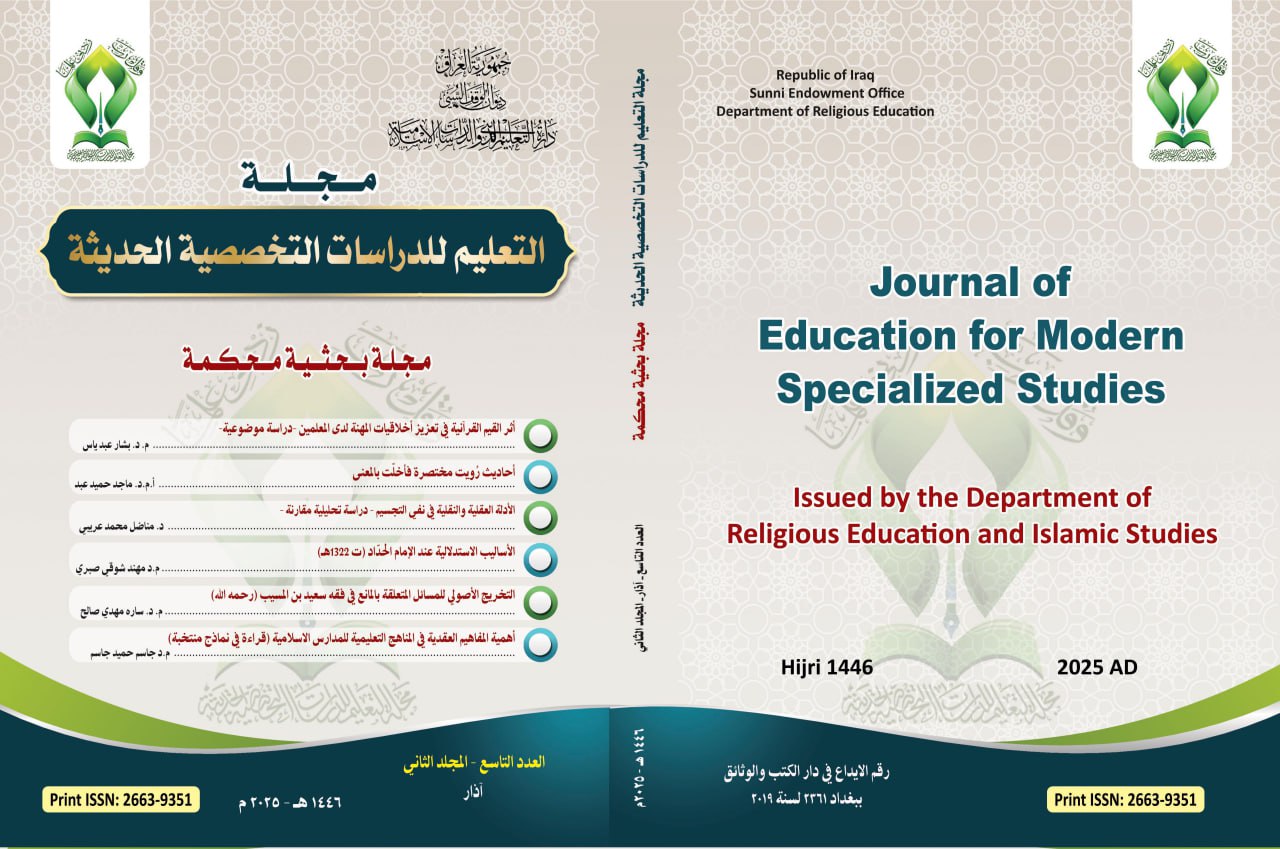Abstract
The Holy Quran serves as the fundamental reference for legislation and ethics for
Muslims and contains numerous values and principles that enhance professional
ethics in general, and the ethics of the teaching profession in particular. This study
aims to explore the impact of Quranic values in promoting professional ethics among
teachers and to analyze how these values can be applied in the educational context
to improve both the pedagogical and ethical performance of teachers. The problem
addressed by the study is that some teachers may face challenges in adhering to professional
ethics due to social and cultural changes. Therefore, this study investigates
the extent to which Quranic values influence teachers in maintaining professional
ethics and whether these values contribute to fostering responsibility, sincerity, and
respect in educational work. The study aims to:
1. Identify the most important Quranic values related to professional ethics.
2. Analyze the impact of these values on the behavior and ethics of teachers in the
educational field.
3. Provide recommendations to enhance the role of Quranic values in improving
the ethical practices of teachers.
The study employed the descriptive-analytical approach and concluded that Quranic
values play a pivotal role in enhancing professional ethics among teachers and can
contribute to improving the educational environment if systematically applied. Educational
institutions need to intensify efforts to disseminate these values among
teachers to ensure outstanding pedagogical and ethical performance.
Muslims and contains numerous values and principles that enhance professional
ethics in general, and the ethics of the teaching profession in particular. This study
aims to explore the impact of Quranic values in promoting professional ethics among
teachers and to analyze how these values can be applied in the educational context
to improve both the pedagogical and ethical performance of teachers. The problem
addressed by the study is that some teachers may face challenges in adhering to professional
ethics due to social and cultural changes. Therefore, this study investigates
the extent to which Quranic values influence teachers in maintaining professional
ethics and whether these values contribute to fostering responsibility, sincerity, and
respect in educational work. The study aims to:
1. Identify the most important Quranic values related to professional ethics.
2. Analyze the impact of these values on the behavior and ethics of teachers in the
educational field.
3. Provide recommendations to enhance the role of Quranic values in improving
the ethical practices of teachers.
The study employed the descriptive-analytical approach and concluded that Quranic
values play a pivotal role in enhancing professional ethics among teachers and can
contribute to improving the educational environment if systematically applied. Educational
institutions need to intensify efforts to disseminate these values among
teachers to ensure outstanding pedagogical and ethical performance.
Keywords
exegesis
Holy Quran
Professional Ethics
Quranic sciences
teacher.
Abstract
يشكّل القرآن الكريم المرجعية الأساسية في التشريع والأخلاق للمسلمين، ويحتوي على العديد من
القيم والمبادئ التي تعزز من أخلاقيات المهنة بشكل عام، وأخلاقيات مهنة التعليم بشكل خاص. تهدف
هذه الدراسة إلى استكشاف أثر القيم القرآنية في تعزيز أخلاقيات المهنة لدى المعلمين، وتحليل كيفية تطبيق
هذه القيم في السياق التعليمي لتعزيز الأداء التربوي والأخلاقي للمعلمين. وتتمثل مشكلة الدراسة في أن
بعض المعلمين قد يواجهون تحديات في التمسك بأخلاقيات المهنة في ظل التغيرات الاجتماعية والثقافية.
وعليه، تبحث هذه الدراسة في مدى تأثير القيم القرآنية في توجيه المعلمين نحو الالتزام بالأخلاقيات
المهنية، وما إذا كانت تلك القيم تسهم في تعزيز المسؤولية، الإخلاص، والاحترام في العمل التربوي.
وتهدف الدراسة إلى: 1. تحديد أهم القيم القرآنية المتعلقة بأخلاقيات المهنة. 2. تحليل أثر هذه القيم على
سلوكيات وأخلاقيات المعلمين في الميدان التعليمي. 3. تقديم توصيات لتعزيز دور القيم القرآنية في تحسين
ممارسات المعلمين الأخلاقية. واعتمدت الدراسة على المنهج الوصفي التحليلي، وتوصلت الدراسة إلى أن
القيم القرآنية تلعب دورًا محوريًا في تعزيز أخلاقيات المهنة لدى المعلمين، ويمكن أن تسهم في تحسين البيئة
التعليمية إذا تم تطبيقها بشكل منهجي. تحتاج المؤسسات التعليمية إلى تكثيف الجهود لنشر هذه القيم بين
المعلمين لضمان أداء تربوي متميز وأخلاقي.
القيم والمبادئ التي تعزز من أخلاقيات المهنة بشكل عام، وأخلاقيات مهنة التعليم بشكل خاص. تهدف
هذه الدراسة إلى استكشاف أثر القيم القرآنية في تعزيز أخلاقيات المهنة لدى المعلمين، وتحليل كيفية تطبيق
هذه القيم في السياق التعليمي لتعزيز الأداء التربوي والأخلاقي للمعلمين. وتتمثل مشكلة الدراسة في أن
بعض المعلمين قد يواجهون تحديات في التمسك بأخلاقيات المهنة في ظل التغيرات الاجتماعية والثقافية.
وعليه، تبحث هذه الدراسة في مدى تأثير القيم القرآنية في توجيه المعلمين نحو الالتزام بالأخلاقيات
المهنية، وما إذا كانت تلك القيم تسهم في تعزيز المسؤولية، الإخلاص، والاحترام في العمل التربوي.
وتهدف الدراسة إلى: 1. تحديد أهم القيم القرآنية المتعلقة بأخلاقيات المهنة. 2. تحليل أثر هذه القيم على
سلوكيات وأخلاقيات المعلمين في الميدان التعليمي. 3. تقديم توصيات لتعزيز دور القيم القرآنية في تحسين
ممارسات المعلمين الأخلاقية. واعتمدت الدراسة على المنهج الوصفي التحليلي، وتوصلت الدراسة إلى أن
القيم القرآنية تلعب دورًا محوريًا في تعزيز أخلاقيات المهنة لدى المعلمين، ويمكن أن تسهم في تحسين البيئة
التعليمية إذا تم تطبيقها بشكل منهجي. تحتاج المؤسسات التعليمية إلى تكثيف الجهود لنشر هذه القيم بين
المعلمين لضمان أداء تربوي متميز وأخلاقي.
Keywords
القرآن الكريم، التفسير، علوم القرآن أخلاقيات المهنة، المعلم
